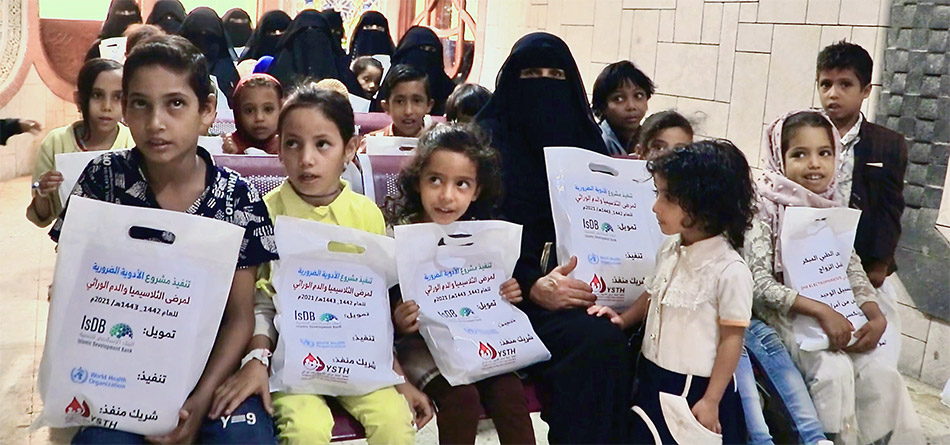
Aden, Yemen, 1 March 2022 – Some 17,788 Yemeni citizens with thalassemia and other genetic blood disorders have received life-saving medications under an emergency World Health Organization (WHO) programme funded by the Islamic Development Bank (IsDB).
The programme has exceeded expectations of delivering life-saving medications to 4,549 patients with thalassemia – the most common genetic blood disorder among Yemeni children and adolescents – as well as other genetic blood disorders by mid February 2022.
“Thousands of patients with thalassemia and other genetic blood disorders were suffering with severe symptoms because they were not getting essential medications,” said Dr Adham Rashad Ismail Abdel-Moneim, WHO Representative to Yemen. “The medicines delivered under the IsDB-WHO programme eased enormous pain and hardship for patients and their families and also saved lives.”
“The IsDB supported this programme to help bridge a dire medications gap that was causing tremendous suffering in Yemen,” said Dr Ilker Ersegun Kayhan, the IsDB Operations Team Leader for the Gulf Cooperation Council (GCC) Countries and Yemen. “We are very gratified to see that the programme has exceeded projections for getting these essential medications to the people who desperately need them.”
Yemen’s seven-year conflict has severely disrupted the supply of medications to treat genetic blood disorders, putting the health and lives of thousands of people at risk. In response, the IsDB-funded WHO programme was launched in 2021. Working closely with Yemen’s Ministry of Public Health and Population, WHO delivered enough medication to the Yemen Society for Thalassemia and Genetic Blood Disorders (YSTH) to meet the needs of its patients for eight months. By the end of December, the YSTH had distributed 197,752 packets and vials of the medications to 17,788 patients, and will continue distributing the rest.
By relying on local capacity, WHO was able to swiftly deliver medications within two months of the start of the programme and save US$ 130,708 of the US$ 362,000 allocated for it. The savings were used to procure hydroxyurea, another lifesaving medicine for people with genetic blood disorders.
YSTH distribution of the medicines, free of charge, has alleviated suffering and been especially important to poor familes and those with more than one patient. The medications have allowed patients to return to normal activities, such as going to school, and decreased their need for pain-killers.
Regular access to deferasirox has been vital, because the drug reduces iron overload, a life-threatening complication of frequent blood transfusions that can cause organ damage, disability, and severe pain.
“The YSTH has reported marked improvement in patients who have been able to receive regular access to medications because of this IsDB-funded WHO programme,” Dr Adham said. “With IsDB support, we will strive to meet the enormous need for these medications. We will also launch new programmes to prevent genetic blood disorders through premarital screenings and awareness campaigns.”
For more information:
WHO and IsDB Support toYemen Society of Thalassemia and Genetic Blood Disorders
WHO and IsDB in Yemen: ensuring treatment for children with genetic blood disorders
For WHO, please contact:
Sufyan Al-Mathani
WHO-Yemen Media Liaison
Mobile: +967-77001-7111 /
e-mail:
For IsDB Group, please contact:
M.A.DinMohammadi,
IsDB Group Regional Communications Officer
Mobile: +90-541228-1010 /
email:


